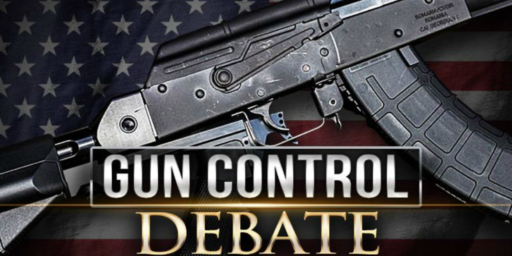Iraq Roundup
A series of interesting developments in Iraq overnight:
WaPo: U.S. Opts To Delay Fallujah Offensive
U.S. Marines have postponed plans to mount an attack against insurgents holed up here and instead will attempt to regain control of this violence-wracked city without a full-scale offensive, military commanders said Sunday.
Concerned about the repercussions an attack could generate across Iraq and the Arab world, senior U.S. military and civilian officials said they had decided to try to confront a band of hard-core Sunni Muslim insurgents, who have effectively taken over Fallujah, by having Marines conduct patrols in the city alongside Iraqi security forces.
The new strategy, reached in consultation with the White House over the weekend, represents an effort by U.S. officials to avoid a military incursion that could entail urban combat, civilian casualties and a wave of retributive strikes outside Fallujah, further poisoning relations between Iraqis and U.S. occupation forces.
“A military solution is not going to be the solution here unless everything else fails,” said Maj. Gen. James N. Mattis, commander of the 1st Marine Division, which is responsible for securing Fallujah and other areas of western Iraq. Army Brig. Gen. Mark Kimmitt, the chief U.S. military spokesman in Baghdad, said efforts to deal with the insurgency in Fallujah had shifted to “a political track.”
The strategy shift is the latest in a series of U.S. policy reversals designed to placate Iraq’s Sunnis, a once-powerful minority whose postwar disenfranchisement has fueled attacks on U.S. troops and Iraqi security forces. Last week, the U.S. occupation authority announced it would hire back some senior military officers and teachers who were dismissed by the authority because they had been members of former president Saddam Hussein’s Sunni-dominated Baath Party.
LA Times: Insurgents Fortify Positions in Najaf
As U.S. troops await orders to enter this Islamic holy city, militant Shiite cleric Muqtada Sadr and his militia are strengthening their control here, stockpiling weapons, seizing key religious sites and arresting or detaining those who challenge him.
In the last two weeks, Sadr’s followers — many rushing here from Baghdad, Fallouja and other areas of Iraq — have fortified their positions in the city and the neighboring town of Kufa, including at Najaf’s gold-domed shrine of Imam Ali, one of the most revered mosques in the world.
Sadr’s forces have evicted more than 100 rival Shiite clerics and shrine employees, replacing them with their own armed militiamen, who roam the rooftops and courtyards of the shrine with rifles and rocket-propelled-grenade launchers hung over their shoulders.
The cleric’s followers also were stockpiling weapons in mosques, schools, graveyards and private houses around the city, according to U.S. intelligence reports and local residents.
The open challenge to the U.S.-led administration in a city seen as sacred to Shiite Muslims, who make up 60% of Iraq’s population, has put coalition authorities in a quandary. Two weeks ago, U.S. military officials amassed 2,500 troops on the outskirts of Najaf and declared their intention to restore order to the city and kill or capture Sadr. Last week, they softened their stance, saying they wanted to allow more time to reach a peaceful settlement in Najaf.
ABC News: ‘Weapons inspectors’ hurt in Iraq blast
US troops who were at a chemical storehouse that exploded in Baghdad on Monday appear to have included members of the Iraq Survey Group (ISG) hunting for weapons of mass destruction.
Residents have shown a Reuters reporter at the scene identity cards belonging to members of the ISG.
The residents say they found the cards after US soldiers evacuated their casualties.
The reason for the blast is not immediately clear but witnesses say it happened when about 12 US soldiers tried to break into the building.
The structure was destroyed in the explosion and at least one unidentified body and four wounded Iraqis have been evacuated.
It’s unclear why the scare quotes around “WMD inspectors,” since they appear to have been inspecting for WMD. (Last story via Command Post)



